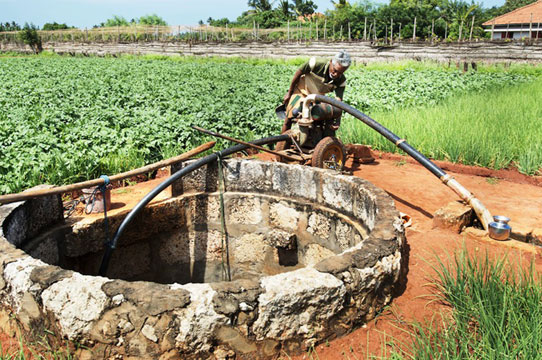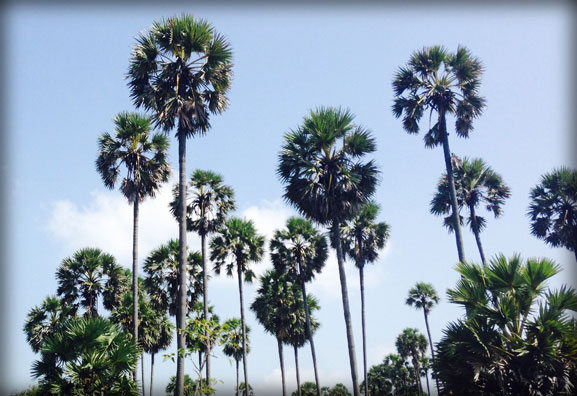For the Palmyrah to bloom...
By Dishan Joseph
The Northern Province of Sri Lanka is a vast and often arid region,
marked with lush green areas of cultivation that once boasted of
bountiful harvests. Ancient Rajadhanis flourished here centuries ago,
beautifully consummating religion, art and culture.The advent of selfish
politics slowly began to erode the social fabric which culminated in
three decades of bloody conflict. The theatre of battle engulfed the
entire province, as the weary civilian population was burdened beyond
redemption. Everything comes at a price and freedom or liberation as
some opine, was ushered into these areas at the cost of many Sri Lankan
lives.
|

Pumping out water from a deep well |
Restoration is a process that consumes time. It is somewhat difficult
for those bearing the physical and deep emotional scars of a bitter
conflict to adjust and move forward with hope. The situation is made
confusing by politically orchestrated statements. Amid the genuine march
towards reconciliation by a majority of Sri Lankans the country has
witnessed some snares with racial overtones. There still remain many
issues that the authorities has to face and resolve. Answers will take
time, so the citizens must exercise greater patience and remain
positive.
Land
Foremost on the list is the allocation of lands belonging to
civilians. This is a long process as it covers a plethora of legalities.
The IMSMA opined that there were one million mines and UXOs (unexploded
ordnance) in the province. Credit must be given to the military and some
NGOs who undertook the task of demining. It is a risk laden mission,
clearing explosive remnants of war (ERW). At present 16 flail machines
are being used to expedite ground verification. As the civil population
is deprived of other social needs, the perceived delay in resettlement
is seen with frustration as many have been living away from their
ancestral lands for years, subjecting them to low social esteem in a
society plagued with caste based prejudice.
The second priority is unemployment. There are only a few thousand in
the entire Northern Province who can boast of doing a Government job,
which has been obtained with political favour.- this is the case in
every province in Sri Lanka. Thousands of men still work inconsistent
daily paid jobs and find it difficult to maintain their families. The
women donít have income generating options apart from sewing and similar
jobs. It creates a void within the family unit which may be one of the
reasons for the rise in crime trends, with an increase in theft which is
not reported. Residents in the Killinochchi and Mullaithivu areas are
afflicted with severe hardship. It is sad to note that young women
(married and single) are engaging in reward based promiscuous activity.
Pregnancies out of wedlock are common but hidden under the blanket of
religion and culture.
Illness
Another issue to counter is the overpowering cloud of mental illness.
There are hundreds of people who need clinical counselling and support.
Children show clear signs of disturbed behaviour patterns, including
selective autism. Some display a horrifying habit of eating sand and
bouts of manic crying. Adults have fallen into the abyss of depression-
mourning for family who have been killed and maimed. Others cry about
families who have been separated for years, as many sought asylum
overseas. (On the other hand we cannot forget the mothers of gallant
soldiers who also cry for their departed sons). These are the terrible
nightmares of war. As the sun sets these are all Sri Lankan mothers.
Widows, mostly aged 20-35 struggle as single mothers, some burdened
with as many as three children. Local authorities must take the effort
to create jobs for these women closer to their homes so that they too
can live with dignity and enjoy life, without being obliged and
dependent on others. Many silently endure verbal and physical abuse. The
lives of older folk aged 65 and above should also be enriched.
Water
Water sustains life. Every civilization flourished around rivers and
lakes. To the people of the North clean drinking water has been an issue
even before the conflict. Neglected and destroyed wells have made it
worse.
It is common to see men and women riding bicycles hauling gallons of
drinking water. Infrastructure must be improved to enrich agriculture
and dairy farming, which once thrived here. Large scale free range
poultry farms coordinated via village Cooperative Societies would be a
rewarding alternative for a steady monthly income.
While many of the roads are in good condition the public donít have
transport to facilitate social interaction. Both, private and CTB buses
can be increased. The citizens have been using the bicycle for decades,
and it must change. Cycling in the dark is a hazard, where one can
encounter a truculent buffalo or elephant. It is pathetic to see
pregnant mothers precariously balancing on a cycle heading to the
clinic, as three wheelers donít operate in villages, especially, when in
need of a medical emergency. The islands of Kayts, Delft, Karaithivu,
Punguduthivu and Mandathivu need better facilities including vocational
training schools to upgrade technical skills of the youth. Projects
related to seafood, such as, dried fish can be upgraded. A Treasury
owned company, North Sea Ltd, was established in 2001 to manufacture
fishing nets to meet local demand. The tourism potential of these
resplendent beaches can be a model for eco tourism with the contribution
of the locals.
Positive
Young minds must be influenced with positive thinking. I witnessed an
alarming increase in the consumption of alcohol, among the youth. As
peace was ushered in its benefits have begun to be gradually misused.
Young boys, who once cycled to the kovil, now pedal to the wine shop
to the disdain of their pious parents! These young souls have nothing to
engage in, not even a hobby, and are misled into excessive drinking as a
form of mental release.
Some staff of the magnificently restored Jaffna Library confided that
the number of students who genuinely read is slowly decreasing. English
books are also not read much, even among graduate teachers.
|

Palmyrah trees - another dormant Northern treasure |
This is sad as the library was envisaged and built by many scholars
and clergy including, Fr. Timothy Long, the late Rector of St.Patricks
College and the linguist genius, the late Fr. Dr. H.S. David. The youth
must be directed towards sports. It builds team work. Once again the
military can take some credit for organizing sports related tournaments
in collaboration with certain schools.
The palmyrah tree
Another dormant northern treasure is the Palmyrah tree. The structure
of the tree is all about survival. After germination the Palmyrah takes
one full year to produce a single leaf, a slow, but steady growth. It
begins to flower in about 15 years. This tough tree teaches us a
valuable life lesson- growth takes time.
The palm reaches heights of 30 meters and lives to a grand 120 years!
There are about 9 million palmyrah trees in the North, thanks to the
replanting efforts of the Palmyrah Development Board (set up in 1978).
The products could be improved (food and handicrafts), and emphasis
placed on marketing its eco friendly side to consumers, including
tourists, as Colombo is now engulfed in an Ďorganicí purchasing trend.
Another issue at divisional level is the issuing of documents such as
birth/death certificates, marriage certificates, national identity cards
and deeds.
Over the years, many have not had the ability to obtain them which is
being addressed by the Resettlement Authority, established in 2007. The
verification of details given takes time, and again people are subjected
to a waiting period.
Prosperity
While we all have our own ethnic background we must unite in our
common Sri Lankan identity. It is of paramount significance if we are to
reach sustainable prosperity, ensuring the rights of every citizen. The
census of 1881 indicates 1,370 Sinhalese and 10,416 Muslims living in
Jaffna. In 2012 these figures remain at 32,300 Sinhalese and 32,360
Muslims.
While this may seem like an increase it is not sufficient for a
period that spans 134 years. Multi -ethnic integration in the Northern
Province is vital to dispel doubt and make people understand and respect
cultural diversity.
Embracing diversity is the key that upholds nations like America,
Australia, Canada and England where many Sri Lankans are domiciled.
In this backdrop Colombo -6 (Wellawatte) is a brilliant example of
all communities co -existing harmoniously, though the predominant
majority are Tamil speaking persons.
Therefore, the northern citizenry must willingly accommodate their
Sinhala and Muslim brothers in the vast lands of the resplendent North,
while still amiably holding to their traditions, sacred rituals and ways
of life.
This is the ultimate hallmark of brotherhood and reconciliation and
would dispel the biased doubts of both domestic and global critics.
It will forever silence political predators that thrive on division.
May all Sri Lankans unite and aspire to make this a reality. |

